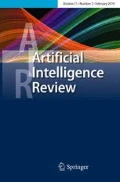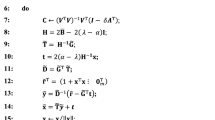Abstract
This article proposes a new influence productivity assessment methodology that is a cognitive intelligence system for the scenario planning of control impacts (generation and choice) for systems that are represented by directed weighted signed graphs based on the algorithm of effective controls. The algorithm implements a control model that expresses the direction of development (growth) of the system. The algorithm is based on the spectral properties of the adjacency matrix of a graph representing the model of a socioeconomic system and does not impose any constraints on the directions of the edges or the sign and weight range on the edges. Scenarios are assessed based on their compliance with tactical and strategic goals according to the codirectionality degree of the response vector with respect to the base vector of the model. The base vector is the effective control vector without constraints on the controls under the conditions of adequate model operation. The new methodology has three distinctive features: (1) the scenario approach is implemented with respect to a set of controls, (2) this approach is applicable for models with heterogeneous factors and does not require preliminary aggregation of the primary model elements of the system; and (3) this approach has a clear formalization metric for the selecting and generating of a set of control impacts. The process does not require the decision maker to have special mathematical training.




Similar content being viewed by others
References
Ahmed A, Woulds C, Drake F, Nawaz R (2018) Beyond the tradition: using fuzzy cognitive maps to elicit expert views on coastal susceptibility to erosion in Bangladesh. CATENA 170:36–50
Alipour M, Hafezi R, Amer M, Akhavan AN (2017) A new hybrid fuzzy cognitive map-based scenario planning approach for Iran’s oil production pathways in the post-sanction period. Energy 135:851–864
Arvan M, Omidvar A, Ghodsi R (2016) Intellectual capital evaluation using fuzzy cognitive maps: a scenario-based development planning. Expert Syst Appl 55:21–36
Awasthi A, Omrani H (2018) A scenario simulation approach for sustainable mobility project evaluation based on fuzzy cognitive maps. Int J Model Simul 38:1–11
Bertsekas DP (1982) The method of multipliers for equality constrained problems. In: Constrained optimization and Lagrange multiplier methods. Academic Press, Elsevier, pp 95–157. https://www.sciencedirect.com/book/9780120934805/constrained-optimization-and-lagrange-multiplier-methods#book-description
Butterworth J, Dunne PE (2016) Spectral techniques in argumentation framework analysis. In: Computational models of argument. Frontiers in artificial intelligence and applications, vol 287. Computational Models of Argument IOS Press Ebooks, pp 167–178
Büyüközkan G, Vardaloğlu Z (2012) Analyzing of CPFR success factors using fuzzy cognitive maps in retail industry. Expert Syst Appl 39(12):10438–10455
Felix G, Nápoles G, Falcon R, Froelich W, Vanhoof K, Bello R (2019) A review on methods and software for fuzzy cognitive maps. Artif Intell Rev 52(3):1707–1737
Gadiyaram V, Ghosh S, Vishveshwara S (2016) A graph spectral-based scoring scheme for network comparison. J Complex Netw 5:219–244
Glykas M (2012) Performance measurement scenarios with fuzzy cognitive strategic maps. Int J Inf Manag 32(2):182–195
Hobbs BF, Ludsin SA, Knight RL, Ryan PA, Biberhofer J, Ciborowski JJH (2002) Fuzzy cognitive mapping as a tool to define management objectives for complex ecosystems. Ecol Appl 12(5):1548–1565
Kim D-H (2004) Cognitive maps of policy makers on financial crises of south Korea and Malaysia: a comparative study. Int Rev Public Adm 9(2):31–38
Knight CJK, Lloyd DJB, Penn AS (2014) Linear and sigmoidal fuzzy cognitive maps: an analysis of fixed points. Appl Soft Comput 15:193–202
Kosko B (1986) Fuzzy cognitive maps. Int J Man Mach Stud 24(1):65–75
Kwahk K-Y, Kim Y-G (1999) Supporting business process redesign using cognitive maps. Decis Support Syst 25(2):155–178
Mendon M, Chrun IR, de Arruda LVR, Papageorgiou EI (2013) Autonomous navigation applying dynamic-fuzzy cognitive maps and fuzzy logic. In: Papadopoulos H, Andreou AS, Iliadis L, Maglogiannis I (eds) Artificial intelligence applications and innovations, AIAI 2013. IFIP advances in information and communication technology, vol 412. Springer, Berlin. https://doi.org/10.1007/978-3-642-41142-7_22
Mendonca M, da Silva ES, Chrun IR, Arruda LVR (2016) Hybrid dynamic fuzzy cognitive maps and hierarchical fuzzy logic controllers for autonomous mobile navigation. In: 2016 IEEE international conference on fuzzy systems (FUZZ-IEEE), pp 2516–2521
Mendonça M, Angelico B, Arruda LVR, Neves F (2013) A dynamic fuzzy cognitive map applied to chemical process supervision. Eng Appl Artif Intell 26(4):1199–1210
Mendonça M, Chrun IR, Neves F, Arruda LVR (2017) A cooperative architecture for swarm robotic based on dynamic fuzzy cognitive maps. Eng Appl Artif Intell 59:122–132
Nørreklit H (2003) The balanced scorecard: what is the score? A rhetorical analysis of the balanced scorecard. Account Organ Soc 28(6):591–619
Pandey B, Bhanodia PK, Khamparia A, Pandey DK (2019) A comprehensive survey of edge prediction in social networks: techniques, parameters and challenges. Expert Syst Appl 124:164–181
Papageorgiou EI, Salmeron JL (2013) A review of fuzzy cognitive maps research during the last decade. IEEE Trans Fuzzy Syst 21(1):66–79
Pluchinotta I, Esposito D, Camarda D (2019) Fuzzy cognitive mapping to support multi-agent decisions in development of urban policymaking. Sustain Cities Soc 46:101402
Poczeta K, Kubuś Ł, Yastrebov A (2019) Analysis of an evolutionary algorithm for complex fuzzy cognitive map learning based on graph theory metrics and output concepts. Biosystems 179:39–47
Rodriguez-Repiso L, Setchi R, Salmeron JL (2007) Modelling IT projects success with fuzzy cognitive maps. Expert Syst Appl 32(2):543–559
Salmeron JL, Vidal R, Mena A (2012) Ranking fuzzy cognitive map based scenarios with TOPSIS. Expert Syst Appl 39(3):2443–2450
Schneider M, Shnaider E, Kandel A, Chew G (1998) Automatic construction of FCMs. Fuzzy Sets Syst 93(2):161–172
Shafia MA, Rahimi Moghaddam M, Teimoury E (2016) Ranking fuzzy cognitive map based scenarios using ELECTRE III: applied on housing market. Expert Syst 33(5):417–431
Tikhonov A, Arsenin V (1977) Solutions of Ill-posed problems. Wiley, New York
Tsadiras AK, Kouskouvelis I, Margaritis KG (2003) Using fuzzy cognitive maps as a decision support system for political decisions. Lecture notes in computer science. Springer, Berlin, pp 172–182
Tselykh A, Tselykh L (2015) Methodology for comparative cognitive modeling based on the analysis of fuzzy target and control factors. Izv SFedU Eng Sci 7(168):101–115
Tselykh AN, Vasilev VS, Tselykh LA, Barkovskii SA (2017) Method maximizing the spread of influence in directed signed weighted graphs. Adv Electr Electron Eng 15(2):203–214
Tselykh A, Tselykh L, Vasilev V, Barkovskii S (2018) Knowledge discovery using maximization of the spread of influence in an expert system. Expert Syst 35(6):e12312
Tselykh A, Vasilev V, Tselykh L (2019) Management of control impacts based on maximizing the spread of influence. Int J Autom Comput 16(3):341–353
Yoon BS, Jetter AJ (2016) Comparative analysis for fuzzy cognitive mapping. In: Portland international conference on management of engineering and technology (PICMET), pp 1897–1908
Zhang L, Chettupuzha AJA, Chen H, Wu X, AbouRizk SM (2017) Fuzzy cognitive maps enabled root cause analysis in complex projects. Appl Soft Comput 57:235–249
Acknowledgements
This work was supported by the Southern Federal University.
Author information
Authors and Affiliations
Corresponding author
Additional information
Publisher's Note
Springer Nature remains neutral with regard to jurisdictional claims in published maps and institutional affiliations.
Rights and permissions
About this article
Cite this article
Tselykh, A., Vasilev, V. & Tselykh, L. Assessment of influence productivity in cognitive models. Artif Intell Rev 53, 5383–5409 (2020). https://doi.org/10.1007/s10462-020-09823-8
Published:
Issue Date:
DOI: https://doi.org/10.1007/s10462-020-09823-8




